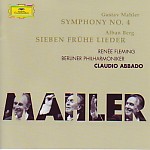You would think that a conductor who has been given several decades to record multiple versions of the Mahler symphonies with the orchestras of Chicago, Vienna, and Berlin would turn in one performance that belongs at or near the top of the list. Well, Claudio Abbado hasn’t done it yet, and evidently he isn’t about to start. This performance improves somewhat on his unimpressive Vienna Philharmonic first attempt, but it’s still not very special. In keeping with his current “Mahler lite” approach, he has freshened up his tempos–considerably so in the Adagio, which now lasts less than 20 minutes. Of all Mahler symphonies, the Fourth stands to benefit from the chamber-music textures that Abbado conjures from his Berlin players, but as so often seems to be the case these days, he and his players step over the boundary that separates observance of detail from narcissistic micro-management, and the work suffers accordingly.
For example, the first-movement exposition goes splendidly, with superb playing from the strings and woodwinds. But at the famous passage for four unison flutes, problems set in. The flutes play too smoothly and the development breaks up into a series of disconnected bits. Once again, the Berlin Philharmonic proves itself to be a group of extremely talented individuals rather than a cohesive ensemble. Trumpets and horns are notably weak throughout, cautious when they should be bold (try the wimpy climaxes of the first movement and adagio). But more to the point, as a result of live recording, even obvious details get overlooked. At the opening of the scherzo, for example, the horn ignores his hairpin crescendos and accents, and this combination of facelessness as compared to, say, the generous and otherwise admirable enthusiasm of the clarinets in the trio sections, cripples the musical texture, robbing Mahler’s part-writing of its inner life. Going all out for detail is fine as far as it goes, but the playing here is simply patchy.
Nor are the problems entirely a question of phrasing and accent. In the Adagio, Abbado’s newfound emphasis on flow may be applauded, but not when he starts the series of abruptly accelerating variations too quickly, and so has no room to increase the energy as Mahler demands–and more to the point, misses the humor of the entire section. Again the issue is consistency. Two flutes playing forte should color and not drown out the violins playing pianissimo at measure 213: Mahler is painting in subtle brushstrokes here, and not gaudy dabs. It’s all well and good to take great pains over dynamics in differentiating levels of piano and pianissimo, but why not give the same attention to the quality of ensemble at mezzo-forte and above? In sum, Abbado and Berlin achieve results that are impressive in spots, but ultimately they fail to maintain the very standard that they set for themselves. Perhaps in the studio much of this could have been corrected.
As for the finale, Renée Fleming is simply vile. Not only is her voice too heavy for the part, but she adopts a tasteless and mannered delivery that would make Elisabeth Schwarzkopf blush. Just check out her second stanza: Abbado slows down abruptly, and you can practically see Fleming petulantly pouting as she sings of the butcher Herod slaughtering the oxen. It’s exactly the opposite of the innocence that Mahler demands, and it achieves precisely the effect he warns against in his note to the singer: that of parody. I am frankly shocked that Abbado tolerated it. In the Berg songs Fleming sounds more comfortable and delivers a lovely performance, but if you want this coupling, you can have it far more successfully from Chailly and the Royal Concertgebouw Orchestra on Decca, with Barbara Bonney far superior to Fleming in the symphony and just as good in the Berg songs.
The live sonics are strange. Fleming’s voice seems to weave in and out of the instrumental texture, while the orchestra itself often comes across as thin and desiccated, lacking in body. Now one thing the Berlin Philharmonic certainly has is a fabulous string section, particularly the violins, with a notably full tone even in pianissimo. I’ve heard them live many times, and you may have too, and if so you will realize right away that they don’t ever sound like this. The low recording level and sometimes odd balances may have something to do with exaggerating the pointillism of the interpretation as a whole, but it’s still clear just how hit-and-miss much of it is. The back of the CD tray quotes two bits of fulsome praise of Abbado and Fleming from the Berliner Morgenpost so grotesque (“Perhaps one fine day this Claudio Abbado will become the first conductor in the world to be beatified while still on the rostrum”) that it’s embarrassing, not to mention musically beside the point. In sum, this is second rate, inexcusably so.
































